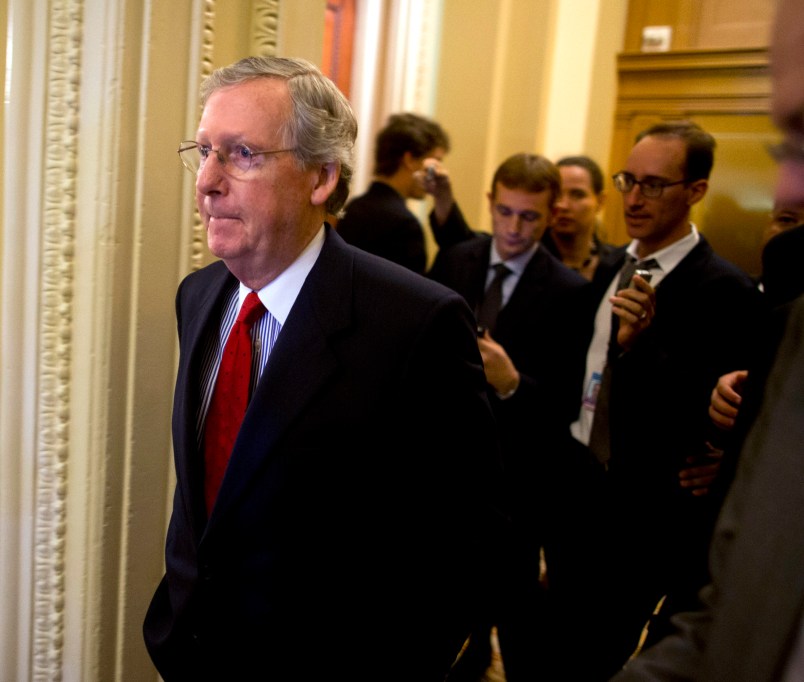Despite trying and failing twice this year to extract a ransom for lifting the debt ceiling, Republicans were defiant Tuesday against newly introduced legislation designed to permanently eliminate the threat of a debt default.
The proposal was unveiled by Sens. Chuck Schumer (D-NY), Barbara Boxer (D-CA) and Mazie Hirono (D-HI), who emphasized repeatedly that it was modeled on a backup proposal by Senate Minority Leader Mitch McConnell (R-KY) during the 2011 debt limit standoff.
Hirono and Boxer called the threat of a default “a weapon of mass destruction” that must be nixed.
Here’s how the bill would work: The president would be able to unilaterally lift the debt ceiling when necessary, and Congress would be able to vote to “disapprove” of it. If the motion to disapprove passes, the president could veto it, and Congress would need to muster up a two-thirds majority to override the veto. In short, it would de-weaponize the debt ceiling.
“So, bottom line: Senator McConnell was right when he proposed this rule in 2011,” Schumer said. “We need to take default off the table. … We want to put the fire out for good.”
McConnell swiftly rejected the proposal as “outrageous” and a “gimmick,” vowing that no Republican senators would support it.
He said Democrats want “to extend the debt ceiling permanently by going around Congress. Let me repeat that: the so-called ‘Schumer-Obama Plan’ is a plan to permanently hand the President a credit card without spending limits, and without lifting a finger to address the national debt. It’s truly outrageous. … [I]f he insists on pushing this ‘Schumer-Obama Plan,’ he’s not going to find any dance partners on this side of the aisle.”
The Republican leader’s staunch rejection reveals that the GOP isn’t ready to give up the threat of default in future standoffs, despite the economic damage caused by the repeated standoffs since 2011, and despite winning no substantive concessions from Democrats this month or in January, when they last voted to extend the debt ceiling.
Back in 2011, the Kentucky Republican floated the idea as a “Plan B” if all else failed. It would have lifted the debt ceiling in three stages through the end of 2012, each time giving Republicans an opportunity to score political points without genuinely threatening default — which is how the debt ceiling has traditionally been used by the party out of power.
A “motion to disapprove” was included in the most recent debt limit hike earlier this month — but not for future hikes. A Democratic aide familiar with the negotiations said McConnell “specifically asked for this resolution of disapproval to be put in, knowing that there wouldn’t be any spending cuts in the agreement. So this was something that he asked for at the last minute.”
The Senate Republican leader retorted Tuesday, “I hear that the Senator from New York is going to try and sell his proposal as a quote-unquote ‘McConnell Plan.’ I appreciate the attempt at a PR gimmick here, but there are two huge differences between the ‘Schumer-Obama Plan’ and what I’ve proposed in the past.” He said his plan wasn’t permanent and that he wanted spending cuts to be included in a debt limit increase.
Asked if any GOP senators were on board with the legislation, Boxer said, “Talks are ongoing with the offices of various Republicans.”






